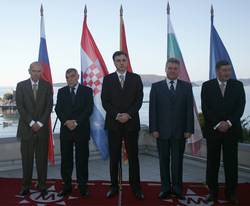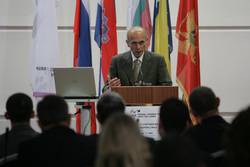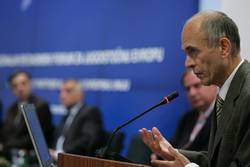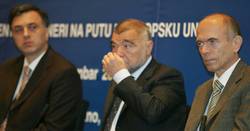 Office of the President of the Republic > Press centre
Office of the President of the Republic > Press centre
Slovenian president at SE Europe Regional Economic Forum
Montenegro, Pržno, 11/16/2006 | press release, speech, statement

The President of Slovenia, Dr. Janez Drnovšek, attended today on the invitation of Montenegrin President Filip Vujanović the third Regional Economic Forum for Southeast Europe, which is being held in Pržno, Montenegro.
The forum, which is a non-governmental initiative, brings together the leaders of regional states, as well as representatives of economic and academic life. Its aim is to facilitate the exchange and presentation of common ideas as the Western Balkan countries progress towards joining the European Union. This year’s forum is therefore entitled "Partners and competitors on the path to the EU".
 Slovenian President Dr. Janez Drnovšek today addressed those in attendance:
Slovenian President Dr. Janez Drnovšek today addressed those in attendance:
"Ladies and Gentlemen, during this discussion I was thinking about how the other one-time republics of the former Yugoslavia could also be successful Member States of the EU, as Slovenia is, if there had not been the tragic break-up of Yugoslavia, the war and everything else that we all know very well.
 If we had then possessed sufficient strength to resolve issues and mutual relations and to break up Yugoslavia through civilised dialogue and decent human relations, if indeed this had happened in some way to Yugoslavia, today – and I am deeply convinced of this – all of us would be members of the EU and the standard of living in all the former Yugoslav republics would be higher. This should serve as a warning and message to all of us and especially to future generations about what should no longer be allowed to happen, and about what kinds of policy should not be repeated; that nationalist, populist policies should never again be repeated.
If we had then possessed sufficient strength to resolve issues and mutual relations and to break up Yugoslavia through civilised dialogue and decent human relations, if indeed this had happened in some way to Yugoslavia, today – and I am deeply convinced of this – all of us would be members of the EU and the standard of living in all the former Yugoslav republics would be higher. This should serve as a warning and message to all of us and especially to future generations about what should no longer be allowed to happen, and about what kinds of policy should not be repeated; that nationalist, populist policies should never again be repeated.
 I am glad that for the greater part of the former Yugoslavia this represents the past, that the majority of politicians now think differently and that they are now thinking about how to find a path into the EU and how they can provide a better life for their citizens. Apart from Slovenia, which is already an EU Member State, this path is now being pursued successfully by Croatia, Macedonia and Bosnia and Herzegovina, and they in turn have now been joined by Montenegro. I am convinced that even those republics that are currently still faced with their own problems will succeed in becoming EU Member States. At the same time, the EU has a duty to ensure the institutional and other conditions in order for this to be possible within the foreseeable future. A European prospect is needed for everyone, since there is no better or other alternative; or rather there is no alternative to the EU, in other words a united Europe established on democratic principles and on the foundations of common economic cooperation. And not just economic cooperation, but also political cooperation and mutual respect, as well as the observance and respect of human rights.
I am glad that for the greater part of the former Yugoslavia this represents the past, that the majority of politicians now think differently and that they are now thinking about how to find a path into the EU and how they can provide a better life for their citizens. Apart from Slovenia, which is already an EU Member State, this path is now being pursued successfully by Croatia, Macedonia and Bosnia and Herzegovina, and they in turn have now been joined by Montenegro. I am convinced that even those republics that are currently still faced with their own problems will succeed in becoming EU Member States. At the same time, the EU has a duty to ensure the institutional and other conditions in order for this to be possible within the foreseeable future. A European prospect is needed for everyone, since there is no better or other alternative; or rather there is no alternative to the EU, in other words a united Europe established on democratic principles and on the foundations of common economic cooperation. And not just economic cooperation, but also political cooperation and mutual respect, as well as the observance and respect of human rights.
The EU is currently struggling with some problems of its own. In places we can see a resurgence of egoistic tendencies, which the past has shown, however, to be wrong, since after two world wars in the 20th century Europe has come to the realisation that it must fundamentally change its mutual relations, and these must be placed in an institutional framework in order to avoid national egoism, since sooner or later that would lead to war.
We must therefore continuously reiterate that the reason for the existence of the EU is not just economic, it is not simply for the EU to be more successful in the world, and more competitive, but also for it to be protected from itself. So that it does not destroy itself, as it has done for centuries. And so that we might establish a solid framework of mutual cooperation, respect and accommodation of each other, so that the past that Europe has experienced, that horrific past, will never again be repeated.
It is clear that this also applies to the area of the former Yugoslavia, in other words what happened should not be allowed to happen again. The European framework is the right framework for this, since in spite of everything the motivation of the former Yugoslav republics and that of other European countries derive from one and the same thing: the desire for peace and the desire to ensure through cooperation a higher quality of life, and for everyone to be ensured a promising future.
Such an EU is needed not just be Europe, but by the world, since within it the EU must play a progressive role and be an important – if not the most important – factor for balancing development in the world and not the kind of development that we have now.
With regard to actual economic development, our mutual cooperation is very important. Slovenia is striving to be as active as possible in this area, it is trying to pursue the greatest possible economic cooperation, trade and investment, whereby we can help each other on this European path.
I believe that we are already taking advantage of many of these possibilities. A great many more still exist, and we must exploit them to the full. In spite of everything we can communicate with each other; language is not a barrier, although there are many variations, so it is hard to know all of them, but the bottom line is, we can communicate and understand each other. We also have common experiences, we come from the same system, legally and economically, and we are entering into the EU. In this regard, Slovenia’s experiences can certainly benefit all the others that will be joining the EU.
Competitiveness is important, although I would like as always to point out that this should not be at the expense of the environment. This means that it should not exceed certain boundaries established on the one hand by ecology and on the other hand by basic social relations in society. Every development must be such that it offers some prospect and hope for all citizens, but it should not arouse the impression that only a section of citizens, only a certain section of people have some prospect, while all others are permanently marginalised. In that case major problems would arise sooner or later, so in our ambition to be as competitive as possible we must always have in our thoughts: fundamental social justice on the one hand, and on the other, not destroying the land, air and water, since these are becoming increasingly important factors which in the end will acquire much greater importance than any competitiveness. Thank you."
After the conference Dr. Drnovšek responded to media questions:
How do you comment on the report of the World Economic Forum, which ranks Slovenia in 30th place out of 117 countries covered?
Dr. Janez Drnovšek: "Each country has its pluses and minuses, its advantages and weaknesses. In Slovenia we know that many things could still be better. But if we look at our position and our development in the last 15 years, we can be pleased. Slovenia’s economic position is solid and I am convinced that, of course with a sensible policy, we can do even more in the future."
You stated that you are concerned about the prospects for the European Union, since it has problems with itself, with its own concept and its institutions, and it will first have to find solutions for itself in order to become capable of further solutions. What does this mean for countries in this region that are waiting to catch that train one day?
Dr. Janez Drnovšek: "The countries of Southeast Europe urgently need a European perspective. Although we are often not especially pleased with the European Union, it is nevertheless by far the best option that exists, and these countries need it; they need a goal in front of them. They wish to enter the European Union, and this is also their motivation therefore to carry out the necessary reforms and to make the necessary effort. If not, various nationalist, radical and extreme policies might once again prevail. So the European Union must also be conscious of this; that it also has a similar responsibility, and that it in fact represents the goal and the hope for other countries, not just in Southeast Europe, but for Europe as a whole."